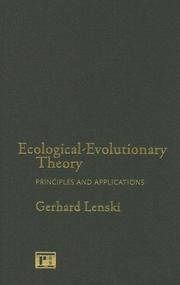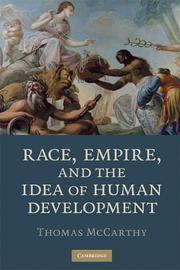| Listing 1 - 9 of 9 |
Sort by
|
Book
ISBN: 9782711619894 2711619893 Year: 2008 Publisher: Paris : Vrin,
Abstract | Keywords | Export | Availability | Bookmark
 Loading...
Loading...Choose an application
- Reference Manager
- EndNote
- RefWorks (Direct export to RefWorks)
La question de la méthode est ici abordée à partir d'une réflexion sur trois concepts : le paradigme, la signature, l'archéologie. L'analyse du paradigme permet de dessiner les lignes essentielles d'un chapitre qui fait défaut dans l'histoire de la logique occidentale - la théorie de l'exemple et de l'analogie. Sur les traces des traités de l'âge baroque et de la Renaissance de signatura rerum, le deuxième volet définit la signature comme " signe dans le signe ", qui joue un rôle décisif dans l'interprétation des signes, de la théorie médiévale des sacrements à Benveniste, de la doctrine des transcendantaux à Warburg et à Freud. Le troisième, enfin, poursuit les analyses de Foucault sur la relation entre archéologie et histoire et pose un concept d'origine qui ne reste pas isolé dans le passé, mais qui, comme les mots indo-européens en grammaire comparée ou l'enfant en psychanalyse, ne cesse d'agir dans le présent pour le rendre intelligible. L'entrelacs de ces trois nœuds problématiques ouvre l'espace d'un court traité sur la méthode, question première et ultime pour tout travail en philosophie et en sciences humaines.
Methodology --- Paradigm (Theory of knowledge) --- Foucault, Michel, --- Paradigme (Philosophie) --- Methodology. --- Méthodologie --- Foucault, Michel, - 1926-1984 --- Philosophie --- Paradigme (philosophie) --- Archéologie et histoire --- Signatures --- Méthodologie
Book
ISBN: 9780367484729 Year: 2021 Publisher: Abingdon, Oxon ; New York, NY : Routledge,
Abstract | Keywords | Export | Availability | Bookmark
 Loading...
Loading...Choose an application
- Reference Manager
- EndNote
- RefWorks (Direct export to RefWorks)
"Navigating the Postqualitative, New Materialist and Critical Posthumanist Terrain Across Disciplines is an accessible introductory guide to theories, paradigm shifts and key concepts in postqualitative, new materialist and critical posthumanist research. Supported by its own website, this first book in a larger series is an essential companion to the primary texts and original sources of the theorists discussed in this and other books in the series. Disrupting the theory/practice divide, the book offers a postqualitative reimagining of traditional research processes. In doing so, it guides readers through the contestation of binaries, innovative concepts, and the practical provocations that make up the postqualitative terrain. It orients the researcher in the ontological re-turn, also by considering Indigenous knowledges, African, Eastern and young children's philosophies. The style itself is postqualitative through diffractive engagements by the authors and the website includes some examples of the practical provocations described in the book that give an imaginary of how postqualitative research can be taught and enacted. This book is an essential resource for novice as well as experienced researchers working both within and across disciplines in higher education"--

ISBN: 1594511004 Year: 2005 Publisher: Boulder, Colo. ; London : Paradigm Publishers,
Abstract | Keywords | Export | Availability | Bookmark
 Loading...
Loading...Choose an application
- Reference Manager
- EndNote
- RefWorks (Direct export to RefWorks)
Human evolution --- Social evolution --- Human ecology --- Social ecology --- Homme --- Paradigme (Philosophie) --- Ecologie humaine --- Ecologie sociale --- Philosophy --- Philosophy. --- Evolution --- Philosophie
Book
ISBN: 2890458466 9782890458468 Year: 1989 Publisher: LaSalle, Québec : Hurtubise HMH,
Abstract | Keywords | Export | Availability | Bookmark
 Loading...
Loading...Choose an application
- Reference Manager
- EndNote
- RefWorks (Direct export to RefWorks)
Ethnology --- Human ecology --- Paradigm (Theory of knowledge) --- Social evolution --- Anthropologie sociale et culturelle --- Ecologie humaine --- Paradigme (Philosophie) --- Philosophy --- Philosophie --- Literature --- Barthes, Roland, --- Philosophy. --- Literature - Philosophy --- Human ecology - Philosophy --- Barthes, Roland, - 1915-1980
Book
ISBN: 9782844855831 2844855830 Year: 2012 Publisher: Paris : Allia,
Abstract | Keywords | Export | Availability | Bookmark
 Loading...
Loading...Choose an application
- Reference Manager
- EndNote
- RefWorks (Direct export to RefWorks)
Spécialiste de Zhuang Zi et de la philosophie chinoise, Jean-François Billeter nous invite dans ce petit ouvrage à une réflexion féconde et profonde, à un "changement de paradigme". Le mot est à la mode, mais il est ici employé au sens plein. En effet, il s'agit de changer la manière dont nous pensons, agissons, dont nous concevons le rapport entre notre corps et notre esprit. Pour Billeter, il ne faut plus voir l'esprit comme ce qui fait agir le corps, mais le corps comme ce qui fait advenir l'action, la pensée, et la transcendance. Il n'est pas question ici de revenir au dualisme, fût-il inversé, mais de concevoir le corps comme une activité : "L'esprit ne descend plus sur nous, mais se forme en nous, de bas en haut. La dimension d'inconnu est au fond du corps et de son activité, elle n'est plus quelque part au-dessus" (p. 77). Il n'y a donc plus de transcendance, mais simplement moi, avec ma part de mystère, d'inconnu que j'ignore moi-même, et qu'il me faut laisser advenir. À travers les notions d'activité et d'intégration, associées au travail du corps, l'auteur nous invite à repenser la manière dont les idées nous viennent, la souffrance psychique, la religion ou le rapport au temps. Ce qui "prend" le lecteur dans ce livre, c'est la manière dont Jean-François Billeter décrit la naissance en nous de gestes (verser du vin dans un verre), d'idées ("L'idée vient en parlant", comme l'écrit Kleist), d'actions (Que vais-je faire aujourd’hui ?), d'une manière si précise qu'elle amène vraiment à s'interroger sur cet "avènement" de la pensée, comme production de l'activité du corps.
Paradigm (Theory of knowledge) --- Act (Philosophy) --- Free will and determinism --- Paradigme (Philosophie) --- Action (Philosophie) --- Libre arbitre et déterminisme --- Philosophy --- Philosophie --- S01/0500 --- China: Bibliography and reference--Sinology, sinological institutes, proceedings of conferences --- Libre arbitre et déterminisme --- Thought and thinking
Book
ISBN: 9782842698775 Year: 2009 Publisher: [Montpellier] : Presses universitaires de la Méditerranée,
Abstract | Keywords | Export | Availability | Bookmark
 Loading...
Loading...Choose an application
- Reference Manager
- EndNote
- RefWorks (Direct export to RefWorks)
French literature --- Social evolution --- Sociology --- Literature and society --- Littérature française --- Paradigme (Philosophie) --- Sociologie --- Littérature et société --- Social aspects. --- Philosophy. --- Philosophy --- Aspect social --- Philosophie --- Bataille, Georges, --- Criticism and interpretation.
Book
ISBN: 9782859399863 2859399860 2757427040 Year: 2007 Volume: 21-22 Publisher: Villeneuve d'Ascq : Presses Universitaires du Septentrion,
Abstract | Keywords | Export | Availability | Bookmark
 Loading...
Loading...Choose an application
- Reference Manager
- EndNote
- RefWorks (Direct export to RefWorks)
La connaissance à partir d’indices peut-elle fournir un modèle consistant pour interpréter, voire guider le travail en sciences humaines ? À partir de la conjonction à la fin du xixe siècle entre la lecture des symptômes psychiques indirects chez Freud, de la technique d’attribution des œuvres d’art à partir de détails inventée par Morelli et de la naissance du roman d’enquêtes policières, Carlo Ginzburg a suggéré que le « paradigme indiciaire » constituait un modèle des « sciences humaines » dont le procédé consiste à « inférer à partir des effets ». Ce « paradigme » hériterait de la riche tradition de la sémiotique médicale et de la mantique, et aurait été en partie préservé par certaines disciplines partant de signes, trouvés ou suscités, pour parvenir, au moyen de leur « lecture », à la connaissance de leur « cause » : les symptômes du médecin, les indices de l’enquêteur, le détail pictural, l’écriture manuscrite, les traces relevées par le chasseur. Les études réunies ici interrogent la pertinence et les limites de la connaissance indiciaire depuis des perspectives croisées : philosophie, histoire, anthropologie, linguistique, histoire des sciences, préhistoire, médecine ancienne, philologie, sémantique, sémiotique, littérature.
Paradigm (Theory of knowledge) --- Paradigms (Social sciences) --- Paradigme (Philosophie) --- Paradigmes (Sciences sociales) --- Ginzburg, Carlo --- Knowledge, Theory of --- Classification --- Knowledge, Sociology of --- Ginzburg, Carlo. --- Knowledge, Sociology of. --- Knowledge, Theory of (Sociology) --- Sociology of knowledge --- Communication --- Public opinion --- Sociology --- Social epistemology --- גינצבורג, קרלו --- Knowledge, Theory of - Congresses --- Classification - Congresses --- histoire --- indice --- interprétation --- lecture --- paradigme --- psychologie

ISBN: 9780521740432 9780521519717 0521519713 0521740436 9780511814044 0511814046 Year: 2009 Publisher: Cambridge : Cambridge University Press,
Abstract | Keywords | Export | Availability | Bookmark
 Loading...
Loading...Choose an application
- Reference Manager
- EndNote
- RefWorks (Direct export to RefWorks)
In an exciting study of ideas accompanying the rise of the West, Thomas McCarthy analyzes the ideologies of race and empire that were integral to European-American expansion. He highlights the central role that conceptions of human development (civilization, progress, modernization, and the like) played in answering challenges to legitimacy through a hierarchical ordering of difference. Focusing on Kant and natural history in the eighteenth century, Mill and social Darwinism in the nineteenth, and theories of development and modernization in the twentieth, he proposes a critical theory of development which can counter contemporary neoracism and neoimperialism, and can accommodate the multiple modernities now taking shape. Offering an unusual perspective on the past and present of our globalizing world, this book will appeal to scholars and advanced students of philosophy, political theory, the history of ideas, racial and ethnic studies, social theory, and cultural studies.
Social evolution --- Race --- Imperialism --- Political Philosophy --- Philosophy --- Paradigme (Philosophie) --- Impérialisme --- Philosophy. --- Social Sciences --- Political Science --- Social evolution - Philosophy --- Race. --- Imperialism. --- Colonialism --- Empires --- Expansion (United States politics) --- Neocolonialism --- Political science --- Anti-imperialist movements --- Caesarism --- Chauvinism and jingoism --- Militarism --- Physical anthropology --- Cultural evolution --- Cultural transformation --- Culture, Evolution of --- Culture --- Evolution --- Social change
Book
ISBN: 1859722792 Year: 1996 Publisher: Aldershot : Avebury,
Abstract | Keywords | Export | Availability | Bookmark
 Loading...
Loading...Choose an application
- Reference Manager
- EndNote
- RefWorks (Direct export to RefWorks)
Philosophy, English --- Political science --- Organism (Philosophy) --- Social evolution --- Philosophie anglaise --- Science politique --- Organisme (Philosophie) --- Paradigme (Philosophie) --- Philosophy --- Philosophie --- Spencer, Herbert, --- Political and social views --- Pensée politique et sociale --- Individualism --- -Organism (Philosophy) --- -Administration --- Civil government --- Commonwealth, The --- Government --- Political theory --- Political thought --- Politics --- Science, Political --- Social sciences --- State, The --- Economics --- Equality --- Self-interest --- Sociology --- Libertarianism --- Personalism --- Persons --- History --- -Philosophy --- Spencer, Herbert --- -スペンサー --- ハーバート・スペンサー --- Contributions in political science --- -History --- -Contributions in political science --- Pensée politique et sociale --- Political philosophy --- Political and social views. --- Philosophy.
| Listing 1 - 9 of 9 |
Sort by
|

 Search
Search Feedback
Feedback About UniCat
About UniCat  Help
Help News
News